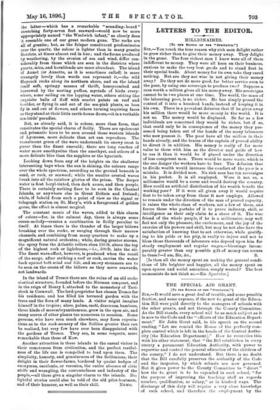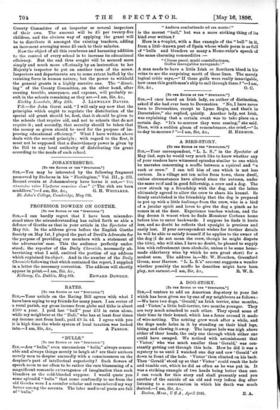THE SPECIAL AID GRANT.
[TO TR. EDITOR Or THR "SPECTATOR."]
Six, It would save a great deal of trouble, and some possible friction, and some expense, if the new 4e. grant of the Educa- tion Bill were paid directly to the managers of schools with the other grants, and not through the County Committee. As the Bill stands, every school will be as much subject as it is now to the Code and the " officers of the Education Depart- ment." Sir John Goret said, in his speech on the second reading, "Let me remind the House of the perfectly com- plete control which is left in the hands of the Central Autho- rity [the Education Department]." How be reconciles this with his other statement, that "the Bill establishes in every county a paramount Education Authority, with power to supervise and control the general education of the children of the county," I do not understand. But there is no doubt that the Bill carefully preserves the authority of the Code and the inspector, by which schools are now governed. But it gives power to the County Committee to " direct " how the 4s. grant is to be expended in each school, " for the purpose of improving the teaching staff as regards number, qualification, or salary," or in kindred ways. The discharge of this duty will require a very close knowledge of each school, and therefore the employment by the County Committee of an inspector or several inspectors of their own. The amount will be £5 per twenty-five children, and the obvious way of applying the grant will be to distribute it amongst the existing teachers, adding an increment averaging some £5 each to their salaries.
Now the object of all this cumbrous and harassing addition to the control of every school is to increase its educational efficiency. But the end thus sought will be secured more simply and much more effectually by an instruction to her Majesty's inspector to put on another turn of the screw. Inspectors and departments are to some extent baffled by the resisting force in human nature; but the power to withhold the general grants is a highly coercive one. The " direct- ing" of the County Committee, on the other hand, after causing trouble, annoyance, and expense, will probably re- sult in the schools remaining as they are.—I am, Sir, &c., P.S.—Sir John Gorat said, " I will only say now that the principles which ought to regulate the distribution of the special aid grant should be, first, that it should be given to the schools that require aid, and not to schools that do not require it ; and secondly, that security should be taken that the money so given should be used for the purpose of im- proving educational efficiency." What I have written above deals with the second principle ; with regard to the first, it must not be supposed that a discretionary power is given by the Bill to any local authority of distributing the grant according to the needs of each school.







































 Previous page
Previous page